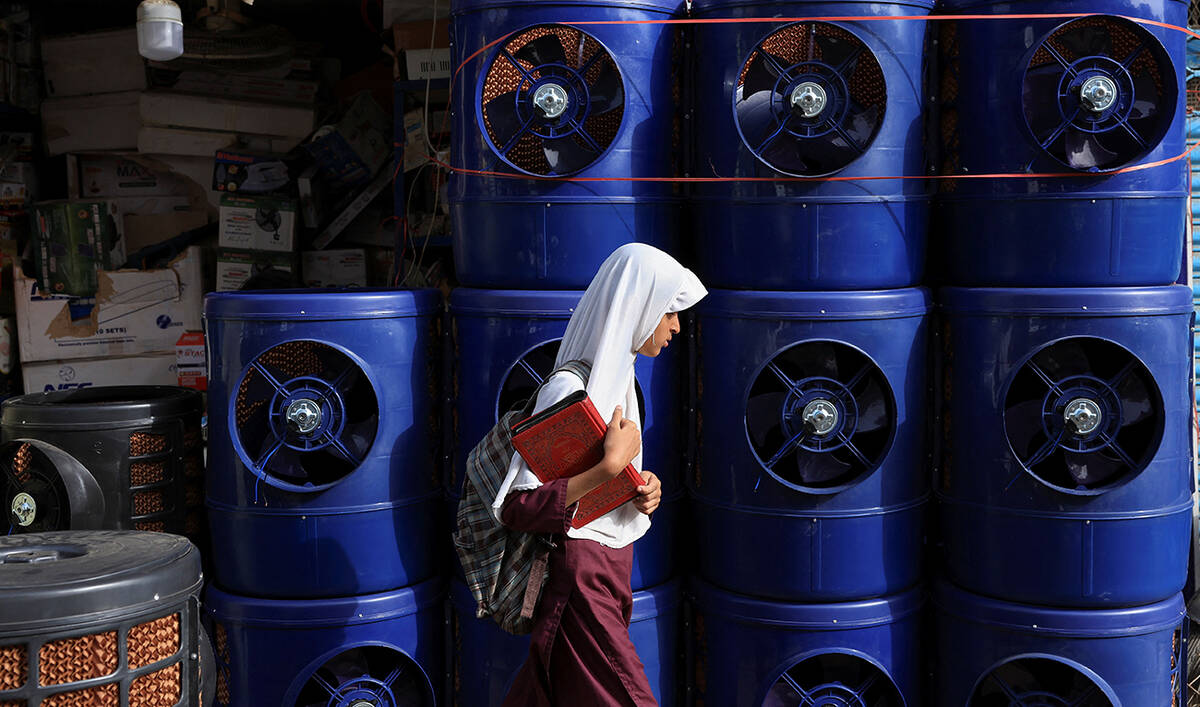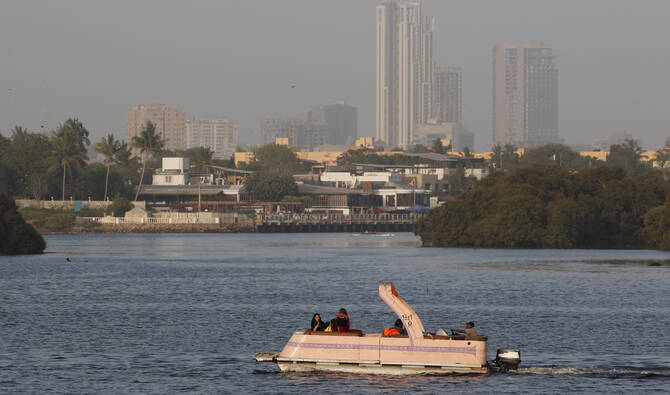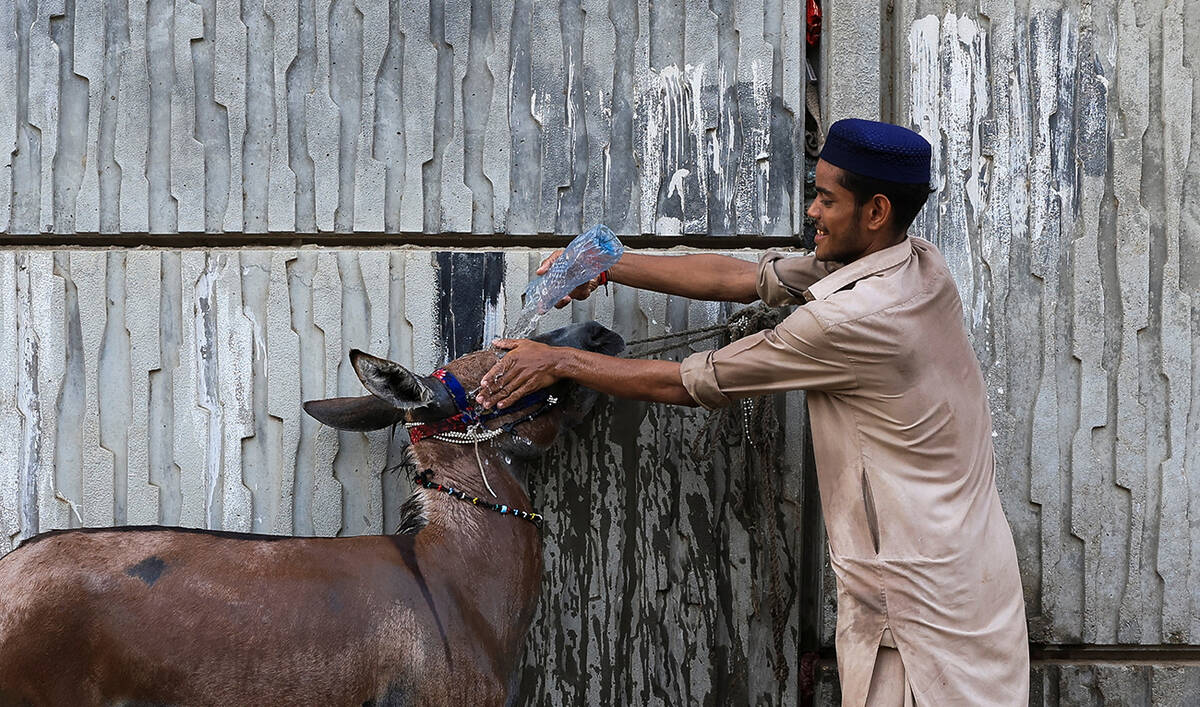KARACHI: The European Union has maintained its ban on the Pakistan International Airlines (PIA) from operating flights to Europe, the European Commission said in a document seen by Arab News, citing “no grounds” to amend a list of countries barred from operating flights to the bloc.
PIA flights to Europe and the UK have been suspended since 2020 after the European Union Aviation Safety Agency (EASA) revoked the national flag carrier’s authorization to fly to the bloc following a pilot license scandal that rocked the country.
The issue, which followed a plane crash in May 2020 that killed nearly a hundred people, had resulted in the grounding of 262 of Pakistan’s 860 pilots, including 141 of PIA’s 434.
“The Commission considers that at this time there are no grounds for amending the list of air carriers, which are subject to an operating ban within the Union with respect to air carriers certified in Pakistan,” read the document released by the European Commission last week.
The document said the status of Pakistani air carriers will remain unchanged, in contrast with PIA CEO Muhammad Amir Hayat’s statement last month in which he expressed confidence that the PIA would resume flights to Europe, including two weekly flights to Paris, in June or July.
EASA and the Pakistan Civil Aviation Authority (PCAA) did not respond to Arab News’ requests for comment.
The document, which pointed to a “noticeable lack of depth of scrutiny” observed by EU experts, did not specify when EASA would conduct its next assessment or if there would be any further on-ground evaluations in Pakistan.
The commission said that EU experts conducted an on-site assessment in Pakistan on November 27-30, 2023.
“It was found that PCAA has an established policy to adhere to international safety standards, and is staffed by technically skilled and professional persons,” the document stated. “Nevertheless, common shortcomings were observed throughout the organization, such as underscoring of non-conformities, and the lack of internal verifications.”
It said Pakistan’s Flight Standards Directorate was “severely understaffed” in terms of sufficiently qualified personnel to perform all certification and safety oversight tasks.
“This situation is aggravated by the assignment of tasks that do not necessarily fall within the Flight Standards remit,” it added.
On the basis of the on-site assessment, the commission said it invited the PCAA to a hearing before the EU Air Safety Committee on May 14.
“At the hearing, PCAA, on the basis of a Corrective Action Plan (‘CAP’) submitted on 6 May 2024, addressed each observation described in the EU visit report, noting the root cause analysis underpinning all corrective measures taken or planned in the short, medium and long term,” it read.
The PCAA indicated the efforts undertaken to rectify the quality management shortcomings identified during the visit, according to the document.
“The Commission also highlighted the need for the government’s continued support, as well as the importance of ensuring leadership stability within the authority as a cornerstone for a well-functioning PCAA,” it stated, adding that EU member states should continue to verify effective compliance of air carriers certified in Pakistan with relevant international safety standards by prioritizing ramp inspections of those carriers.
Pakistan is set to privatize the national airline, which has been facing a financial crisis for the last several years, by June and July as part of the requirements set by the International Monetary Fund (IMF).
On Monday, Privatization Minister Abdul Aleem Khan said Pakistan had selected six companies qualified to bid to buy the PIA. The companies included Air Blue, Arif Habib Corporation, Blue World City, Fly Jinnah, Pak Ethanol (Pvt) Consortiums, and YB Holdings Consortiums.
‘No grounds’: EU says status of PIA flight ban unchanged
https://arab.news/gk6ts
‘No grounds’: EU says status of PIA flight ban unchanged

- The ban was instituted after a pilot license scandal following a 2020 PIA plane crash that killed nearly 100 people
- Development comes weeks after PIA CEO said the airline would resume its flights to Europe in June or July this year
Pakistan, UAE agree to boost cooperation in higher education, human resources

- The UAE is home to over 1.5 million Pakistanis who send more than $5 billion in remittances annually
- Both countries resolve to work on initiatives to benefit students, academic institutions and professionals
ISLAMABAD: Pakistan and the United Arab Emirates (UAE) have agreed to strengthen bilateral cooperation in higher education and human resource development, the Pakistani embassy said on Saturday.
The statement came after a meeting between Pakistan’s Ambassador Faisal Niaz Tirmizi and Dr. Abdulrahman bin Abdulmanan Al-Awar, the UAE minister of human resources, higher education and scientific research.
The UAE is home to more than 1.5 million Pakistani expatriates who live and work in the Gulf country and send back more than $5 billion in remittances to the South Asian country annually.
During the meeting, Ambassador Tirmizi highlighted the contributions of the Pakistani community to the UAE’s development and appreciated the Gulf country for fostering an inclusive and enabling environment for expatriates.
“Both sides reviewed ongoing collaboration and explored avenues to further enhance bilateral cooperation in the fields of higher education and human resource development,” the Pakistani embassy said.
“The discussions reflected a shared resolve to work closely on initiatives that benefit students, academic institutions, and professionals from both countries.”
Ambassador Tirmizi reiterated Pakistan’s commitment to strengthening institutional linkages and advancing cooperation in skill development and workforce preparedness.
“Minister Dr. Abdulrahman Al-Awar lauded the longstanding and brotherly relations between the two countries and expressed the UAE’s keen interest in expanding its partnership with Pakistan in mutually beneficial areas,” the Pakistani embassy said.
“He welcomed sustained dialogue and coordination between the relevant authorities of both nations.”
Three militants killed in ‘encounter’ in Pakistan’s volatile northwest — police

- The Pakistani Taliban have stepped up their attacks against security forces, police in Pakistan’s northwest in recent months
- Counter-terrorism department says the deceased militants had been involved in bomb blasts, attacks on police and other offenses
KARACHI: Three Pakistani Taliban militants were killed in an “encounter” with police and counter-terrorism department (CTD) personnel in Pakistan’s northwestern Khyber Pakhtunkhwa (KP) province, the CTD said on Saturday.
CTD officials from KP’s Bannu district conducted a raid in Lakki Marwat along with local police on intelligence report about the presence of militants, according to a CTD statement.
It resulted into a shootout with militants which left three members of the Pakistani Taliban’s Tipu Gul group dead, whereas officials seized three Kalashnikovs and hundreds of rounds from the site.
“Bannu CTD wanted the deceased terrorists for their involvement in IED (improvised explosive device) blasts, attacks on police and other serious offenses,” the CTD statement said.
Pakistan has struggled to contain a surge in militancy in KP since a fragile truce between the Pakistani Taliban, or the Tehreek-e-Taliban Pakistan (TTP), and Islamabad broke down in late 2022.
The TTP and other militant groups have frequently targeted security forces convoys and check-posts, besides targeted killings and kidnappings of law enforcers and government officials in the region in recent months. Bannu has seen a number of attacks on security forces, while a number of policemen have been killed in targeted killings in Lakki Marwat.
Islamabad accuses India of backing militant groups and Afghanistan of allowing the use of its soil for attacks against Pakistan. Kabul and New Delhi deny the allegation.
As Karachi heats up, class and access divide city into a ‘climate apartheid’

- Pakistan’s largest city exposes a stark class divide in access to electricity and cooling as temperatures soar
- In some neighborhoods, electricity lasts two hours a day while the wealthy stay cool with air-conditioning, solar backup
KARACHI: When the sun rises over the portside slums of Keamari in the Pakistani megacity of Karachi, 48-year-old mason Fazal Rahim steps out with his rusted tools into the searing heat.
By the time he returns home at night, drenched in sweat, there’s often no electricity to power even a single fan.
“It’s still unbearably hot and there’s no electricity either,” Rahim told Arab News.
“Our home turns into a hell, the children cry and heat rashes break out on their skin.”
As Pakistan’s largest city sweltered through a record-breaking heatwave in June, temperatures soared past 42 degrees Celsius (over 107°F), exposing a harsh urban reality: while the wealthy kept cool in air-conditioned homes, the poor suffered hours of unrelenting heat in overcrowded neighborhoods plunged into darkness by extended power outages.
Karachi’s two-tiered climate reality, shaped by class and access, now resembles what human rights advocates describe as “climate apartheid,” a term that captures how climate change disproportionately affects marginalized populations while the wealthy remain buffered.
Hospitals across the city, including the government-run Jinnah Postgraduate Medical Center (JPMC), saw a spike in heat-related illnesses.
“We had nearly a thousand patients last year who came in with heatstroke,” said Dr. Irfan Siddiqui, head of JPMC’s emergency department, citing a rise in cases of dehydration, food poisoning and heat exhaustion this year.
POWER DIVIDE
More than 90 percent of Pakistan’s international trade flows through Karachi, a city of over 20 million people and the country’s economic engine. But despite its centrality to Pakistan’s economy, the city’s basic infrastructure, especially in its low-income neighborhoods, is chronically neglected.

Some residents, like Rahim in Bhutta Village, reported only two hours of electricity in a full day last month. In stark contrast, affluent areas such as Clifton and Defense Housing Authority (DHA) remained largely unaffected by power outages, with many homes powered by private solar panels or diesel generators.
K-Electric, the city’s sole power distributor, insists the disparity is not based on class.
“The load-shedding schedule is purely determined on a commercial basis,” said Bilal Memon, a spokesperson for the utility. “Areas with higher theft and lower bill recovery face longer outages.”
Pakistan’s National Electric Power Regulatory Authority (NEPRA) confirmed in its latest State of Industry Report (2023) that Karachi faces some of the highest transmission and distribution losses among major cities — a result of illegal connections, aging infrastructure, and weak governance. The report also noted that high-loss areas tend to face longer outages as a penalty mechanism.
For those already on the margins, like Tahira Perveen, a widowed asthma patient residing in the low-income Manzoor colony, the unpredictability of the electricity supply can be dangerous.
“As for electricity, no one knows when it will come,” she said. “During the heat, it [the outage] happens all night and all day.”
A CITY GETTING HOTTER
Karachi is among the world’s ten fastest-warming megacities, according to urban climate assessments by the United Nations Environment Program. The city has warmed at nearly double Pakistan’s national average, with temperatures rising by approximately 0.34°C per decade since 1960, according to Sardar Sarfaraz, the former director of the Pakistan Meteorological Department.
The causes are well documented: unchecked urbanization, the destruction of green spaces, and widespread use of concrete that traps heat. Karachi lost over 20 percent of its tree cover between 2008 and 2019, according to satellite data analyzed by the Global Forest Watch platform.

“There are narrow lanes, very, very poorly ventilated houses, and it’s all a concrete jungle,” said Karachi-based climate expert Afia Salam.
“There is a segment, large segment of population, which is more impacted than the others. And then on top of it, if I put the gender lens on, the women are more impacted because culturally, they do not have access to the open spaces.”
Indeed, in the city’s informal settlements, women and children are often confined indoors, where poor ventilation and a lack of cooling options increase health risks during heatwaves.
CLIMATE INEQUALITY
Pakistan is ranked among the top ten countries most vulnerable to climate change, according to the Global Climate Risk Index by Germanwatch. Nearly 45 percent of its population lives below the poverty line, per the World Bank, and the country faces mounting challenges in coping with environmental shocks — from floods and droughts to rising temperatures.
In 2024, the International Monetary Fund approved $1.3 billion in climate-linked funding for Pakistan to support adaptation and resilience efforts. But activists say little climate funding is reaching those most in need.
“The policies being made don’t reflect the ground realities,” said Fatima Majeed, an activist working with coastal communities affected by rising sea levels and heat. “The people for whom these policies are intended are rarely consulted.”

Her concerns were echoed by Yasir Husain, founder of the Karachi-based Climate Action Center.
“We find that the government is least interested in this,” he said. “When there are programs, there is funding. [But] that money is not used to help the vulnerable populations.”
Sindh’s Environment and Climate Change Secretary, Agha Shahnawaz Khan, pointed to ongoing efforts: penalizing smoke-emitting vehicles, tree plantation drives, mangrove restoration and solarizing public buildings.
“We will continue to lag behind until the community supports the government and the government takes proper initiatives,” he said.
COOLING FOR A FEW
Twelve kilometers from Rahim’s baking slum, Dr. Navaira Ali Bangash lives in comfort, her home equipped with air conditioners and backup power systems.
“We are probably the most privileged people who have air-conditioning installed at our homes, offices and even in our cars,” she said. “But then there are those underprivileged people... who cannot even afford basic fans.”

While climate change is often described as a global challenge, in Karachi it is deeply local — a force that exposes long-standing inequalities in housing, infrastructure, and health care.
For Rahim, the national climate discourse and international funding commitments matter little. His immediate concern is whether the ceiling fan in his single-room home will run tonight.
“Electricity [outages] have made our lives miserable,” he said, his voice tired and defeated in the oppressive heat.
Microsoft shifting to partner-led delivery model, not retreating from Pakistan — IT ministry

- The statement follows reports about the closure of Microsoft’s office and lay-off of its employees in Pakistan
- Islamabad to engage with tech giant to ensure any structural changes strengthen its commitment to local customers
ISLAMABAD: Pakistan’s information technology (IT) ministry said on Saturday that global tech giant Microsoft was not retreating from the Pakistani market and was only moving to a partner-led, cloud-based delivery model in the South Asian country.
The statement followed media reports about the closure of Microsoft’s office and lay-off of a small number of employees in Pakistan, sparked by a LinkedIn post by a former head of Microsoft in the country.
The Pakistani IT ministry said the tech giant had shifted its licensing and commercial-contract management for Pakistan to its European hub in Ireland in recent years, while its day-to-day service delivery had been handled entirely by certified local partners.
“Against that backdrop, we understand Microsoft is now reviewing the future of its liaison office in Pakistan as part of a wider workforce-optimization program,” the IT ministry said in a statement.
“This would reflect a long-signalled strategy, consolidating direct headcount and moving toward a partner-led, cloud-based delivery model, rather than a retreat from the Pakistani market.”
Pakistan’s IT sector has witnessed a significant growth in recent years, reaching $3.4 million from July 2024 till May 2025, compared to $2.9 million during the same period the previous year, according to the Pakistani central bank.
Prime Minister Shehbaz Sharif’s government has been striving to further increase these exports to support the $350 billion economy, and the IT ministry sought to allay concerns about the clousure of the Microsoft office.
It said the global pivot from on-premise software (transactional deals) to Software-as-a-Service (SaaS) continues to reshape how technology firms structure their international operations, and Microsoft is no exception.
“Pakistan’s Ministry of IT & Telecom recognizes the strategic value of having leading global technology providers active in the country,” the ministry said.
“We will continue to engage Microsoft’s regional and global leadership to ensure that any structural changes strengthen, rather than diminish, Microsoft’s long term commitment to Pakistani customers, developers and channel partners.”
Trump says tariff letters to 12 countries signed, going out Monday

- Trump in April announced a 10% base tariff rate and additional amounts for most countries, some ranging as high as 50%
- All but the 10% base rate were subsequently suspended for 90 days to allow more time for negotiations to secure deals
NEW JERSEY: US President Donald Trump said he had signed letters to 12 countries outlining the various tariff levels they would face on goods they export to the United States, with the "take it or leave it" offers to be sent out on Monday.
Trump, speaking to reporters aboard Air Force One as he traveled to New Jersey, declined to name the countries involved, saying that would be made public on Monday.
Trump had earlier on Thursday told reporters that he expected a first batch of letters to go out on Friday, a national holiday in the United States, though the date has now shifted.
In a global trade war that has upended financial markets and set off a scramble among policymakers to guard their economies, Trump in April announced a 10% base tariff rate and additional amounts for most countries, some ranging as high as 50%.
However, all but the 10% base rate were subsequently suspended for 90 days to allow more time for negotiations to secure deals.
That period ends on July 9, although Trump early on Friday said the tariffs could be even higher - ranging up to 70% - with most set to go into effect August 1.
"I signed some letters and they'll go out on Monday, probably twelve," Trump said, when asked about his plans on the tariff front. "Different amounts of money, different amounts of tariffs."
Trump and his top aides initially said they would launch negotiations with scores of countries on tariff rates, but the US president has soured on that process after repeated setbacks with major trading partners, including Japan and the European Union.
He touched on that briefly late on Friday, telling reporters: "The letters are better ... much easier to send a letter."
He did not address his prediction that some broader trade agreements could be reached before the July 9 deadline.
The shift in the White House's strategy reflects the challenges of completing trade agreements on everything from tariffs to non-tariff barriers such as bans on agricultural imports, and especially on an accelerated timeline.
Most past trade agreements have taken years of negotiations to complete.
The only trade agreements reached to date are with Britain, which reached a deal in May to keep a 10% rate and won preferential treatment for some sectors including autos and aircraft engines, and with Vietnam, cutting tariffs on many Vietnamese goods to 20% from his previously threatened 46%. Many US products would be allowed to enter Vietnam duty free.
A deal expected with India has failed to materialize, and EU diplomats on Friday said they have failed to achieve a breakthrough in trade negotiations with the Trump administration, and may now seek to extend the status quo to avoid tariff hikes.










